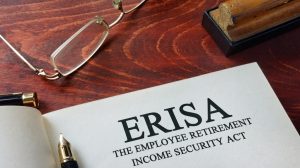ERISA Compliance: What Every Employer Should Know
- May 20, 2025
- Posted by: admin
- Category: Health Plans

Understanding ERISA compliance is not just a legal necessity, it’s a strategic imperative for every employer who offers employee benefits.
The Employee Retirement Income Security Act (ERISA) governs how benefit plans are administered and protects employees’ rights to their benefits.
Whether managing a startup or a well-established organization, getting ERISA right is crucial. This guide will walk you through ERISA, why it matters, what’s required from employers, and how to ensure you stay compliant.
What is ERISA?
ERISA stands for the Employee Retirement Income Security Act of 1974. It was enacted to regulate employer-sponsored retirement and health benefit plans.
While it doesn’t require employers to offer benefits, it sets standards for those who do.
At its core, ERISA ensures that plans are managed in the best interest of employees and that they receive promised benefits. It applies to most private-sector employers, regardless of size.
Why ERISA Compliance Matters
ERISA violations can result in severe penalties, lawsuits, and audits. But beyond legal implications, compliance reinforces trust between employers and employees.
It shows you’re committed to transparency and fairness in how benefits are managed.
Failing to comply can lead to:
- Department of Labor (DOL) penalties
- IRS excise taxes
- Legal disputes from plan participants
- Damage to the company’s reputation

Who Must Comply with ERISA?
ERISA applies to private-sector employers that provide:
- Retirement plans (like 401(k) and pension plans)
- Health and welfare plans (such as medical insurance, dental insurance, vision insurance, life insurance, disability insurance, etc.)
Public employers and religious institutions are generally exempt. However, compliance may still be beneficial for organizational transparency and employee satisfaction.
Key ERISA Requirements for Employers
To stay compliant, employers must address several core obligations under ERISA:
1. Plan Documentation
Every ERISA-covered plan must have a written plan document outlining how it operates, who is eligible, and what benefits are provided.
2. Summary Plan Description (SPD)
Employers must provide participants with a clear, easy-to-understand SPD within 90 days of coverage. It details plan features, rules, and rights.
3. Form 5500 Filing
Most plans must file an annual Form 5500 with the DOL. This form discloses financial, operational, and demographic data about the plan.
4. Fiduciary Responsibility
Employers have a fiduciary duty to act in the best interests of plan participants. This includes prudent investment, fee transparency, and avoiding conflicts of interest.
5. Disclosures and Notices
Timely disclosure of plan changes, annual notices, and participant rights is a must. Failure to do so can lead to fines or audits.

ERISA Compliance Challenges
Compliance isn’t always straightforward. Common pain points include:
- Missing or outdated SPDs
- Inaccurate Form 5500 filings
- Misunderstanding fiduciary duties
- Overlooking required notices
- Not updating plan documents after changes
Staying current with ERISA regulations is vital, especially when rules evolve due to legislation like the Affordable Care Act (ACA) or the SECURE Act.
Best Practices for ERISA Compliance
1. Audit Your Benefit Plans Regularly
Conduct internal or third-party audits to ensure plan documentation and operations align with ERISA standards.
2. Maintain Proper Records
Keep detailed records of all plan documents, communications, and filings. This will be essential in case of a DOL audit.
3. Train Fiduciaries
Ensure that those managing the plan understand their roles and legal obligations under ERISA.
4. Use Professional Guidance
Partnering with an experienced benefits consultant can streamline compliance and reduce the burden on HR teams.
Medcore Brokerage, the Best Employee Benefits Consultant in Texas, specializes in delivering tailored employee benefits solutions designed to meet the unique needs of your business.
Role of Technology in ERISA Compliance
Modern HR and benefits administration platforms can automate key compliance tasks:
- Track eligibility and enrollment
- Distribute SPDs and notices
- Generate and file Form 5500
- Maintain audit trails
- Monitor plan performance
Investing in the right technology can drastically reduce the risk of human error and non-compliance.

ERISA and Other Federal Laws
ERISA intersects with several other regulations, including
- COBRA: Offers continued health coverage for certain qualifying events.
- HIPAA: Protects health information and sets standards for group health plans.
- ACA: Adds specific requirements to health plans, like essential benefits coverage.
- FMLA: Coordinates with benefits continuation during unpaid leave.
Employers must ensure benefit plans are compliant across all applicable regulations.
Consequences of Non-Compliance
Non-compliance isn’t just about monetary fines. It can damage employee trust and lead to long-term reputational issues. Some potential consequences include:
- DOL audits that can trigger other agency reviews
- Civil penalties up to $2,586 per day for late filings
- IRS penalties for non-compliance with tax-related provisions
- Litigation risks from employees over denied or mishandled benefits
Outsourcing ERISA Compliance
Many businesses choose to work with third-party administrators (TPAs) or employee benefits consultants to handle ERISA requirements.
This is especially valuable for companies without in-house legal or compliance teams.
Outsourcing can:
- Minimize legal risks
- Improve the accuracy of filings
- Provide access to expert advice
- Reduce administrative workload
Why Choose Medcore Brokerage for Your Insurance Needs?
Tailored Benefits Just for You– Health, retirement, and extra perks customized to help you attract and keep top talent.
Easy-Peasy Enrollment– No headaches here! Get one-on-one help and simple online tools to make signing up a breeze.
Plans That Fit Your Budget– Affordable options with no hidden costs, so you get great benefits without breaking the bank.
Experts Who’ve Got Your Back– Over 12 years of helping businesses like yours craft the perfect benefits package.
Final Thoughts
ERISA compliance is more than ticking boxes; it’s about building a benefits framework that supports employees and shields your business from liability.
With proper documentation, regular audits, and expert guidance, employers can navigate ERISA requirements confidently.
Prioritizing compliance reflects a commitment to employee well-being, corporate integrity, and long-term organizational success
Frequently Asked Questions (FAQs)
1. Who does ERISA apply to?
Private-sector employers offering retirement or health benefit plans.
2. Are small businesses subject to ERISA?
Yes, even small businesses must comply if they offer covered plans.
3. What is a Summary Plan Description (SPD)?
A document explaining the plan’s benefits, rules, and participant rights.
4. What happens if I don’t file Form 5500?
You may face heavy penalties from the DOL and IRS.
5. What is fiduciary responsibility under ERISA?
It means managing plans in the best interest of participants.
6. Are church or government plans covered by ERISA?
No, they are generally exempt.
7. What is the penalty for late SPD delivery?
Up to $110 per day per participant after DOL request.
8. Can I write my own SPD?
You can, but it must meet specific ERISA requirements. Professional help is recommended.
9. How often should plan documents be updated?
Whenever there’s a plan change, or at least every five years.
10. Should I outsource ERISA compliance?
Yes, especially if you lack in-house expertise, it reduces risk and improves efficiency.

